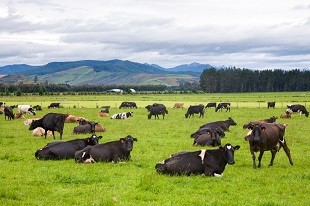I lift. I like to toss around heavy objects because it makes me happy. I also like to keep my hard-earned muscle. After eight years of vegetarianism and four years of veganism I have discovered that eating meat and dairy allows my body to perform at its best.
Throughout my dietary changes I have experimented with a plethora of protein powders. From pea protein to spirulina to whey, I am no stranger to protein supplements. But things got spooky when I started to research what exactly these supplements contained. “Water, whey concentrate, soluble corn fiber, sunflower oil, maltodextrin, artificial flavors, potassium citrate, soy lecithin.” The label looked more like a pop tart package than a healthy protein alternative.

Gif courtesy of giphy.com
My first mission was to find out what these ingredients were. Most dairy protein powders are composed of whey or casein. Whey protein has a strong amino acid profile and is easily absorbed by most people. Whey concentrate is made by pushing the liquid portion of milk through a filter. The percentage of protein varies from about 30% to about 80%.

Photo Courtesy of eatingmadeeasy.com
Whey protein isolate further breaks down proteins using micro-filtration techniques. In a nutshell, concentrates can get away with a high volume of random add-ins, such as soluble corn fiber and soy lecithin. To make it all smell and taste good, artificial flavors and sweeteners are added.

Gif Courtesy of giphy.com
Now that I established just how many additives were in my protein shake, I wondered how this was possible. Are supplements even regulated? Crazily enough, no, they aren’t.

Gif courtesy of giphy.com
FDA acting commissioner Stephen Ostroff has said, “The FDA does not do any review of dietary supplements before they come onto the market, and I think that all consumers need to understand this.” Without any government regulations, supplement companies are expected to test and review their products independently.

Gif Courtesy of giphy.com
In a 2010 Consumer Reports study of fifteen protein drinks, all drinks contained one or more of the following: arsenic, cadmium, lead, and mercury. Yikes. Plant-based protein powders can also contain toxic ingredients. GMOs, synthetic toxins, and preservatives are also present in many protein supplements.
So what is a health-conscious lifter to do? The simple answer is go to Iceland or New Zealand.

Photo courtesy of lifespan.com
Unlike in the United States, in Iceland and New Zealand, all protein powders are made without antibiotics from grass-fed cows. Your next best option is buying organic whey protein isolate with isolate as the first ingredient. If you can’t pronounce the other ingredients and count them all on one hand, put the container back. For now I will continue to advocate for FDA regulations of supplements and enjoy my New Zealand protein shake.



